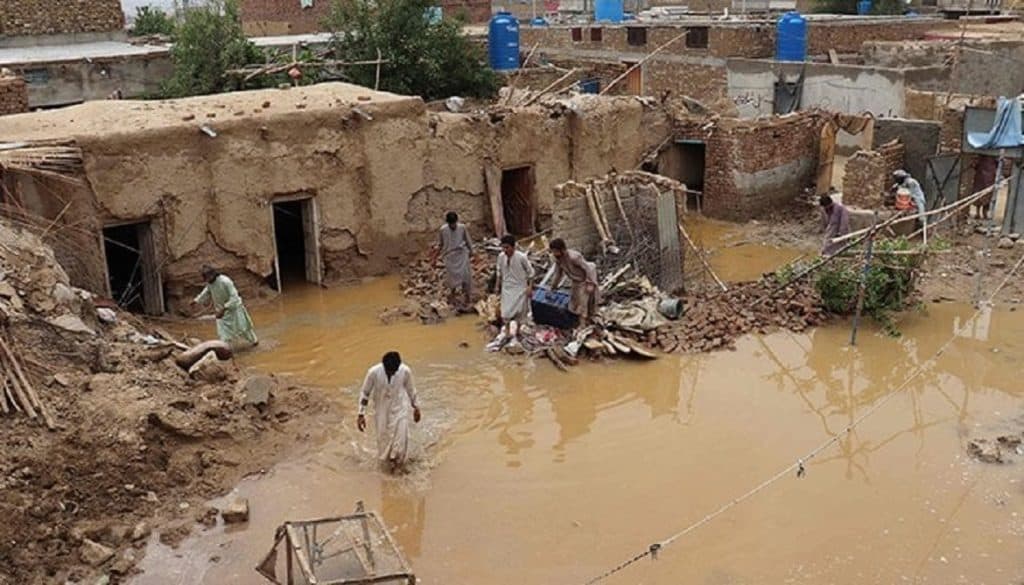By Samra Hamid
The increasing climate change has triggered natural disasters all around the world. Consequently, the impact of these disasters was more intense for the developing countries, whereas those responsible (developed countries) for this major change in the climate remained guarded due to the availability of resources and preventive measures for such disasters.

Similarly, these natural disasters have taken a toll on Pakistan, a developing country, in terms of food insecurity, damage to infrastructure, and human security leaving a greater impact on the economy of Pakistan. Likewise, the least developed province, Balochistan faced even more catastrophic fallouts, as about 9.18 million people were affected by the recent floods.
People affected by the Sindh floods also migrated by the thousands to Balochistan in the hope of finding shelter and food. In this way, Balochistan has been burdened and is suffering more than the rest of Pakistan and is still hopelessly coping with the consequences.
In addition, the recent floods have wreaked havoc on the region’s food security. Similarly, instability is producing a host of social issues, including dangers to human security, in flood-affected parts of Balochistan.
Balochistan, the country’s largest province by area, was caught off guard by a natural disaster in form of the recent floods starting from 14 June to October 2022. Unfortunately, the devastating flood of 2010, around (13 years ago) did not prepare the provincial and the central government to opt for preventive measures, against the imminent climate change and floods in the region. Similarly, despite the magnitude of the disaster of the recent floods which hit Balochistan, it exposed many administrative flaws at the federal and provincial levels, including the ineffectiveness of policies towards the early warning signs. However, floods in Balochistan not only devastated 2,813 KM of road infrastructure, and 119 bridges, but also 103 dams have been severely affected. Among these, 40 dams were completely destroyed which were essential for the water-scarce region. Furthermore, Balochistan’s railway operations were also halted due to bridge damage in the district of Bolan. As a result, the actual lines of communication either through telecom, roads, or railways between the provinces were severed leading to the province`s seclusion.
Apart from the physical destruction, floods also brought incline in the already exhausting food insecurity in Balochistan. As the province is more dependent on livestock and agriculture, the destruction of the crops has resulted in creating food insecurity all around the region. The aftermath of the floods brought food shortages not only due to detached bridges and ruined roadways but also because it destroyed 500,000 of livestock, 2,000 animal shelters and also 6.5 million acres of crops that were affected in the flood-affected districts leading to food insecurity in Balochistan. Resultantly, the prices of common goods have risen in the province. According to National Disaster Management Authority (NDMA), 8 million acres of crops including rice, cotton, pulses, oil seeds and vegetables have been affected all around Pakistan. As a result, Balochistan cannot rely on Punjab or any other province for basic necessities because they are also afflicted by the disaster.
As per the reports, only 50% of the land is left cultivable with no crops sowed in it, whereas the rest is still underwater. Besides, the aftereffect of floods has also left Southwestern Balochistan and Sindh, with a limited amount of onions, as it contributes a major portion of onions to the national market. Correspondingly, the balance of demand and supply has been greatly affected by these floods. Balochistan and Sindh altogether managed to provide only 25,000-30,000 tons of onions to the national market at the price of 320/kg. Whereas, the people of Balochistan were left with a limited number of onions in the markets which are being sold at the highest prices.
Furthermore, flood victims have complained about widespread corruption in the ration supplies they were to receive. Other than the unavailability of rations due to corruption, the victims are also facing difficulties in receiving rations, as they are forced to show their CNICs despite the fact that they have lost everything, including their CNICs, in the floods.
On the other hand, the impact of floods is increasing questions on the human security in the region. As Saeed Kaleem Imam, retired I.G Motorway & Highway Police officer rightly says, “Catastrophe breeds crime”. Similarly, the upsurge in criminal activities in Balochistan clearly explains how the situation will worsen over time. Not only this, but the mafias are moving in too, to capitalize on emergent opportunities in the name of being a flood victim. Psychologically, it is evident that those who have lost their life’s savings and have no food will be more compelled to break the law to survive. Moreover, the aftermath of floods has resulted in the rise of the poverty rate from 3.7% to 4.0%, potentially pushing 8.4 to 9.1 million individuals below the poverty line provincewide. Consequently, human security is being triggered from every dimension in the region, pushing the lower class into a race for survival.
Apart from this aspect of human security, flood victims are also suffering from a variety of ailments. In some situations, there has been a significant increase in cases of waterborne diseases such as Cholera, Malaria, and Dengue, which adds to the dimension of human security in Balochistan. According to the Health Report, 38,476 cases of Malaria, skin and eye disorders, Acute Respiratory Infection, and Cholera have been documented in Balochistan. In such circumstances, people of Balochistan are fighting for their lives in this tormented health structure.
To summarize, poor countries are confronting the most severe consequences of climate change. The industrialized countries, who are responsible for the majority of carbon emissions influencing global temperatures, should change their policies. Similarly, states such as the United States should be obliged to sign the Kyoto Protocol. In terms of assisting flood victims, the international community should offer aid in proportion to the amount of damage sustained. Furthermore, unlike the corrupt ration mafia, relief should be provided to afflicted people through proper responsible channels.
Balochistan, on the other hand is facing not only the severe economic challenges, but also water scarcity, underdeveloped infrastructure, and insufficient food to feed its inhabitants. Preventive measures that the federal and provincial governments can take right now include combating corruption and offering ration, survival, and health kits to flood victims. Second, as far as the accommodation of the victims is concerned, they can be accommodated with those 3,200 government-run schools which are nonfunctional and can be temporarily used for shelters.
Samra Hamid – Research Assistant Fellow Balochistan Think Tank Network (BTTN), Quetta.
(The views expressed in this article belong only to the author and do not necessarily reflect the views of World Geostrategic Insights).
Image Source: AFP







